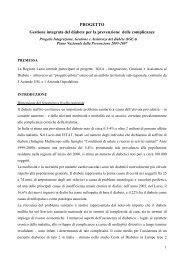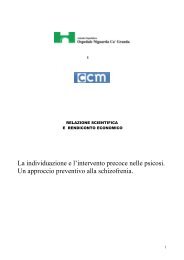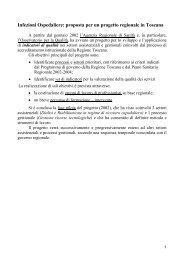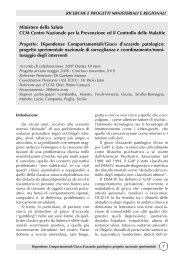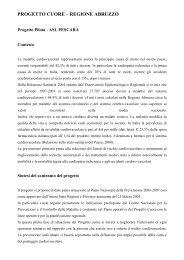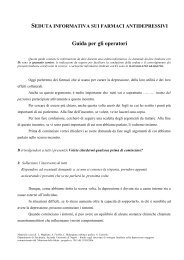Gaining health : analysis of policy development in European ...
Gaining health : analysis of policy development in European ...
Gaining health : analysis of policy development in European ...
You also want an ePaper? Increase the reach of your titles
YUMPU automatically turns print PDFs into web optimized ePapers that Google loves.
Alcohol abuse is a serious and not fully recognized challenge<br />
for shap<strong>in</strong>g policies tackl<strong>in</strong>g NCD. Alcohol is a significant<br />
contributor to major conditions such as heart disease,<br />
cancer and mental <strong>health</strong> problems, as well as <strong>in</strong>juries.<br />
Alcohol is also the lead<strong>in</strong>g risk factor for both disability and<br />
death among young people <strong>in</strong> Europe. Although a WHO<br />
<strong>European</strong> regional framework and an EU strategy (ma<strong>in</strong>ly<br />
emphasiz<strong>in</strong>g dr<strong>in</strong>k<strong>in</strong>g among the young) are <strong>in</strong> place, alcohol<br />
<strong>policy</strong> <strong>development</strong> is one <strong>of</strong> the weakest elements <strong>of</strong> <strong>European</strong><br />
<strong>health</strong> <strong>policy</strong> <strong>development</strong>. Policies to tackle alcohol<br />
abuse require a high level <strong>of</strong> complexity and must face<br />
deeply rooted historical habits, strong economic <strong>in</strong>terests,<br />
mixed messages and a limited number <strong>of</strong> successful <strong>policy</strong><br />
experiences.<br />
The persistent challenge <strong>of</strong> <strong>in</strong>equalities <strong>in</strong> <strong>health</strong><br />
From ongo<strong>in</strong>g research, it is clear that NCD and their risk<br />
factors reflect, and contribute to, considerable <strong>in</strong>equalities.<br />
A report from 2006 (9) <strong>in</strong>dicates that, for 21 EU countries<br />
with relevant data, mortality from CVD is higher among<br />
those <strong>in</strong> lower socioeconomic positions, and smok<strong>in</strong>g is also<br />
likely to be a key factor. The same report states that, <strong>in</strong> 18<br />
countries, national surveys showed that self-assessed <strong>health</strong><br />
was worse among those <strong>in</strong> the lower socioeconomic groups<br />
and that these people frequently have poorer access to<br />
necessary care.<br />
The WHO Commission on Social Determ<strong>in</strong>ants <strong>of</strong> Health,<br />
report<strong>in</strong>g <strong>in</strong> 2008, has gathered a huge body <strong>of</strong> evidence on<br />
plausible causal relations; key areas <strong>in</strong> which action should<br />
take place; and effective practices and <strong>in</strong>terventions for<br />
address<strong>in</strong>g socially determ<strong>in</strong>ed <strong>health</strong> <strong>in</strong>equities (10). The<br />
result<strong>in</strong>g work is accessible on the Internet (http://www.<br />
who.<strong>in</strong>t/social_determ<strong>in</strong>ants/en), <strong>of</strong>fer<strong>in</strong>g examples <strong>of</strong> what<br />
works.<br />
Reth<strong>in</strong>k<strong>in</strong>g <strong>health</strong> care<br />
There is now better understand<strong>in</strong>g that equity <strong>in</strong> access to<br />
care refers not only to the geographical distribution <strong>of</strong> services<br />
but <strong>in</strong>cludes social, economic and cultural issues. The<br />
focus is on “patient-centred care,” mean<strong>in</strong>g that the patient<br />
must clearly be seen to be part <strong>of</strong> the <strong>health</strong> care team.<br />
NCD patients and their families are be<strong>in</strong>g given tra<strong>in</strong><strong>in</strong>g <strong>in</strong><br />
cop<strong>in</strong>g with their disease, and “expert” patients are shar<strong>in</strong>g<br />
their experience with others, <strong>in</strong>clud<strong>in</strong>g <strong>health</strong> care pr<strong>of</strong>essionals.<br />
New technological <strong>development</strong>s may dramatically affect<br />
NCD. The field <strong>of</strong> genetics already provides <strong>in</strong>formation<br />
that can be used to determ<strong>in</strong>e both how diseases are<br />
diagnosed and how new treatments or more specific drug<br />
targets can be identified. Developments <strong>in</strong> pharmaceuticals<br />
have shown success <strong>in</strong> treat<strong>in</strong>g hypertension and diabetes,<br />
for example. Equality <strong>in</strong> access to such new <strong>development</strong>s<br />
must be ensured for vulnerable social groups.<br />
Some <strong>development</strong>s need new skills to ensure that a high<br />
quality <strong>of</strong> care can be delivered to all. Develop<strong>in</strong>g capable,<br />
motivated and supported <strong>health</strong> workers is essential to<br />
achiev<strong>in</strong>g national <strong>health</strong> goals. WHO suggests a “work<strong>in</strong>g<br />
lifespan” approach (11) encompass<strong>in</strong>g: the stage when<br />
people enter the <strong>health</strong> sector workforce, requir<strong>in</strong>g <strong>in</strong>vestments<br />
<strong>in</strong> education and recruitment; participation <strong>in</strong> the<br />
workforce when worker performance should be enhanced<br />
through better management; and reduc<strong>in</strong>g wasteful loss <strong>of</strong><br />
human resources when people leave.<br />
Health services employ about 10% <strong>of</strong> the <strong>European</strong> workforce<br />
(12) and human resources account for as much as<br />
60–80% <strong>of</strong> recurrent expenditure on <strong>health</strong> services. Nevertheless,<br />
<strong>in</strong>formation on human resources and their impact<br />
on NCD is <strong>in</strong>adequate <strong>in</strong> many countries. Human resources<br />
for <strong>health</strong> were the focus <strong>of</strong> a WHO <strong>European</strong> M<strong>in</strong>isterial<br />
Conference on Health Systems <strong>in</strong> 2008 (13,14).<br />
Apart from be<strong>in</strong>g a major employer, the <strong>health</strong> sector<br />
accounts for a considerable amount <strong>of</strong> capital <strong>in</strong>vestment,<br />
procurement <strong>of</strong> drugs, technical equipment and “household<br />
Chapter 6<br />
255<br />
Po<strong>in</strong>ters to the future




